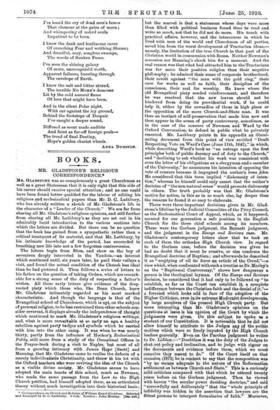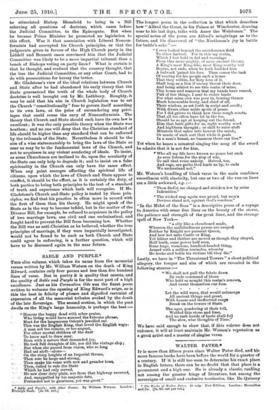BOOKS.
MR: GLADSTONE'S -RELIGIOUS' - CORRESPOND ENCE.* Mn. GLADSTONE was so conspicuously a great Churchman as well aei a great Statesman that it is only right that this side of his career should receive special attention.; and no one could have been found better qualified for the labour of editing his religions and ecclesiastical papers than Mr. 1). Cl..Lathbury, who has alreacly.written a sketch of Mr. Gladstone's life in the character of a `.` Leader of the Church." We are far from sharing all Mr. Gladstone's religions opinions, and still further from sharing all Mr. Lathbury's as they are Set out in his admirably lucid introduction to the various sections into Which the letters are divided. But there can be no question that the book has gained from a sympathetic rather than a critical treatment of its material, and that Mr. Lathbury, by his intimate' knOwledge of the period, has succeeded in breathing new life into not a few forgotten controversies.
The letters begin from Eton, and show us the boy of seventeen deeply interested in the Vaudoise—an interest Which continued until, six years later, he paid their valleys a visit, and found the actual condition of the Church less ideal than he had pictured it. Then follows a series of letters, to his father on the question of taking Orders, which are remark- able for a strong sense of the duty of respecting a father's wishes. All these early letters give evidence of the deep- rooted piety Which those who, like Dean Church, knew Mr. Gladstone intimately regarded as 'hie most marked characterittie. And thOugh the language is that of the Evangelical school of Chnrchthen, which is apt, on the subject of personal religion, to be lase restrained than other schools eon,- eider reverent, it displays already the independence of thought which continued to mark Mr. Gladstone's religious writings; and, what is more remarkable at so early an age, a healthy rebellion against party badges'nd symiols which he carried with him into the other eathP. -It was when he was nearly thirty, partly froth the influence of .Hooker'a. Ecclesiastical Polity, still more from a study of the ,Occeslonal Offices in the Prayer-book dining a visit to Naples, hnt most of all from a growing' intimacy, with . James Hope. [Scott] and Manning, that Mr. Gladstone came to realise the defects of a merely individualistic Christianity, and threw in his lot with the Oxford teachers who were reviving the idea of the Church as a visible divine society.. Mr. Gladstone seems to have adopted the main tenets of this school, much as Newman, who made, the same passage from the Low .to the High Church pdaiticin, had himself adopted them, as an articulated theory withouti much 'investigation into their historical basis ; • Correspondence on Church and Religion of William EmartElacistona. Selected and Arranged by D. C. Lathbury. 2 vols. London: John Murray. [24g. net.] but the marvel is that a statesman whose days were more than filled with political business found time to read and write so much, not that he did not do more. His touch with practical affairs, however, and the intercourse in which he lived with men of the world and Churchmen of all parties, saved him from the worst development of Tractarian ideas,— namely, the limitation of the true Church to that part of the Christian world in communion with Rome. Neither Newman's secession nor Manning's shook him for a moment. And the real reason was that what had attracted him to the Tractarians was far more their positive religion than their negative philosophy ; he admired their sense of corporate brotherhood, their revolt against "the man with the gold ring," their care for works as well as faith, their discipline of the conscience, their zeal for worship. He knew where the old Evangelical piety needed reinforcement, and therefore he was resolved that the new leaven should not be hindered from doing its providential work, if he could help it, either by the cowardice of those in high place or the opposition of the mere Church-and-State man. It was thus an instinct of self-preservation that made him now and then appear in the arena of party controversy, sometimes, as in the case of the censure of Newman and Ward by the Oxford Convocation, to defend in public what he privately resented. Mr. Lathbury prints in his appendix an illumi- nating document from this point of view entitled "Draft Respecting Vote on Ward's Case (June 11th, 1847)," in which, while describing Ward's book as "an outrage upon the first principlei both of public decency and of duty to the Church," and " declining to ask whether his work was consistent with even the letter of his obligations as a clergyman and a member of the University," he announces his intention of opposing the vote of censure because it impugned the author's bona fides. He considered that this term implied "dishonesty, of inten- tion," whereas he himself could only assert that the author's doctrine of "the non-natural sense" would promote dishonesty in others. The truth probably was that Mr. Gladstone's motive for action, in this as in so much else, lay deeper than the reasons he found it so easy to elaborate.
There were three important, decisions given in Mr. Glad- stone's lifetime by the Judicial Committee of the Privy Council, as the Ecclesiastical Court of Appeal, which, as it happened, secured for our generation a safe position in the English Church for the three chief schools among its members. -These were the Gorham judgment, the Bennett judgment, and the judgment in the Essays and Reviews case; Mr. GlidstOne's contemporary letters show that he took oil each of them the orthodox High Church view. In regard to the Gorham case, before the decision was given he lad no doubt that it must be evasive, or else condemn the Evangelical doctrine Qf Baptism; and afterwards be described it as "emptying of all its force an article-of the Creed,",—a View which, when confronted with such a treatise as Dr, Aftaley's on the "Baptismal Controverey," shows bow dangerons a person is the theological layman. Of the Essays and Review decision, he considered that it had only to be followed up "to establish, as far as the Court can establish it, a complete indifference between the Christian faith and the denial of it,", re a forecast which looks odd in face of the adoption of the Higher even in its extrom WPM* development/4, b,y large numbers of the present High Church party. But more interesting than Mr. Gladstone's opinions on the Options at issue is 143 opinion of the Court by which the judgments were given, On this subject he spoke. as a student of our Constitution. It Is noticeable that he did not allow himself to attribute to the Judges any of the politic motives whieb were se freely imputed by the High Church leaders generally. lven on the Pprohas judgment be writes to Dr. Ididdon:—" Doubtless it was the duty of the Judges to Shut oat policy and inclination, and to judge with rigour on the document's and evidence before them, which we must COopeiN.'e they meant to do." Of the Court itself on that occasion (1871) be is content to say that the composition was "by no means adequate to the nature of the Reformation settlement as between Chnrch and State." This is a curiously Mild criticism ecimpared with that which he uttered twenty years before on the Gorham judgment. Then he viewed with horror "the &Copier power deciding doctrine," and said " sorrowfully and deliberately " that the " whole principle of infidelity was hidden in the assertion that lawyers are the fittest pereons to interpret formularies of faith..." Moreover,
he stimulated Bishop Blomfield to bring in a Bill referring all questions of doctrine, which came before the Judicial Committee, to the Episcopate. But when he became Prime Minister be promoted no legislation to this effect. Was it that association with Liberal Noncon- formists had corrupted his Church principles, or that the judgments given in favour of the High Church party in the Liddell and Bennett cases convinced him that the Judicial Committee was likely to be a more impartial tribunal than a bench of Bishops voting on party lines P What is certain is that he thought, and realised that the country thought, that the leas the Judicial Committee, or any other Court, had to do with prosecutions for heresy the better.
Mr. Gladstone's view of the ideal relations between Church and State after he had abandoned his early theory that the State guaranteed the truth of the whole body of Church doctrine is well brought out by Mr. Lathbnry. Roughly, it may be said that hie aim in Church legislation was to set the Church " constitutionally" free to govern itself acoording to its own laws, at the price of surrendering any privi- leges that could rouse the envy of Nonconformists. The theory that Church and State should each have its own law is excellent; it was the only possible theory when the State was heathen ; and no one will deny that the Christian standard of life should be higher than any standard that can be enforced by the tribunals of the State. Nevertheless it should be the aim of a wise statesmanship to bring the laws of the State as near as may be to the fundamental laws of the Church, and not to acquiesce in any violent sundering of ideals. To insist, as some Churchmen are inclined to do, upon the secularity of the State can only help to degrade it; and to insist on a false spirituality in the Church can only have the same effect. When any point emerges affecting the spiritual life of citizens, upon which the laws of Church and State appear to conflict, it should be the effort, as it is certainly the duty, of both parties to bring both principles to the test of a standard Of truth and experience which both will recognise. If Mr. Gladstone's Church and State policy is tested by these prin- ciples, we find that his practice is often more in accord with the first of them than his theory. He might speak of the State as in the way to become infidel, but in the matter of the Divorce Bill, for example, he refused to acquiesce in the policy bf two marriage laws, one civil and one ecclesiastical, and fought hard to prevent the Bill from becoming law. Whether the Bill was as anti-Christian as he believed, whether the true principles of marriage, if they were impartially investigated, would not be found to be such as both Church and State could agree in enforcing, is a further question, which will have to be discussed again in the near future.























































 Previous page
Previous page